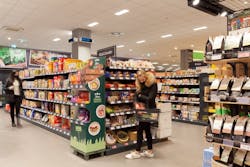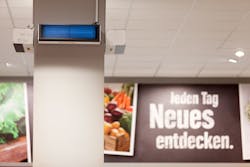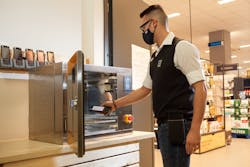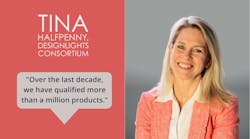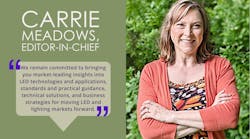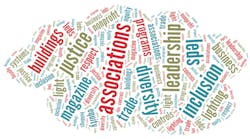A small supermarket in Hamburg, Germany is trialing UV-C purifiers as one possible method its larger group might use to remove coronavirus that could be present in the air. The branch of the national Edeka chain has also deployed a UV-C disinfection chamber to clean handheld scanners that employees share.
The 14,538-ft2 Edeka Clausen store in Hamburg has mounted 31 Philips UV-C disinfection fixtures from Signify, at between 10.5 ft and 11.5 ft high and pointing them outwards, parallel to the floor. The purifiers use conventional mercury vapor technology, not LED, to generate the ultraviolet radiation, which is invisible but commonly referred to as “light.”
UV-C has a shorter wavelength than ultraviolet in the A and B bands. When applied at optimal doses, it has been proven to kill SARS-CoV-2, also known as the coronavirus, which causes COVID-19. In a Boston University study earlier this year, Signify UV-C at 254 nm deactivated the virus in a matter of seconds.
But UV-C also comes with health hazards when people are exposed to it. It is damaging to skin and eyes, raising the question of whether the outward facing UV-C at the Edeka outlet is safe.
“It is not harmful to people shopping in the store because the radiation is only in the upper third of the room,” a Signify spokesperson told LEDs Magazine. “The minimum installation height for these products is 2.50m (8.2 ft). So we can make sure there is no radiation in the area where people walk around or sit. We do extensive measurements and tests to make sure the radiation is only there where we need it to be.”
Signify offers another style of high-mount UV-C air purifier that hangs from a ceiling and points upwards — away from the floor and shielded from humans — cleaning the air that circulates through the gap created by the suspension, such as those it has provided soccer teams PSV Eindhoven in Holland and RB Leipzig in Germany.
“We have two different products, one for ceiling mount and one for wall mounting,” the Signify spokesperson told LEDs. “Every room is different. We decide in the planning phase which product fits the need of the customer best.”
It is conceivable that the outward-pointing units could be more efficacious or cost-effective than the ceiling models, which are limited to the upper room air that squeezes through the gap.
Both styles rely on circulating air. Edeka has not altered the circulation system at the Hamburg Edeka Clausen store. Signify charges about €1000 for each wall-mounted UV-C luminaire plus installation and maintenance, so the store would have paid a mid-five-figure sum.
Installation took about two or three days after store opening hours last week at the branch, after which Edeka and Signify ran radiation testing before turning on the purifiers this week.
What’s not clear is what percentage of a room’s air reaches the purifiers at any one time, and how much of it might still be infected by the time it rises to purifier level, or would otherwise have still been infected by the time it fell again without the purification. Research indicates that the airborne coronavirus can survive for up to three hours.
“As air flows through the room and with natural convection eventually all air gets in the radiation zone at the ceiling and gets disinfected,” the spokesperson said.
While exact overall effectiveness of the system at this point in time is inconclusive, the UV-C air disinfection would seem at the least to be a further extra line of defense.
There are fewer questions surrounding the reach of the Signify UV-C disinfection chamber — called the Philips BioShift UV-C disinfection chamber — that Edeka Clausen is using onsite to rid objects such as handheld scanners of the coronavirus.
“We are proud that we are the first supermarket in Germany to provide both our shoppers and our employees an additional layer of protection,” said Edeka Clausen managing director Dirk-Uwe Clausen.
Another Edeka outlet in Hamburg is trialing a different SARS-CoV-2 air disinfection system, which is aimed at localized areas rather than across the entire store, the Signify spokesperson said. It’s not clear whether that facility is using UV-C or something else. Signify does not appear to be involved in it. Other stores in the Edeka network will consider using the technologies based on the Hamburg pilots, the spokesperson noted. Edeka had around 11,200 outlets in a count earlier this year. Edeka Clausen is part of the Edeka Nord subgroup, which has about 670 stores in the north of Germany.
The Signify air purifiers and disinfection chamber are among the products that have emerged from Signify’s push to ramp up 12 families of UV-C germ fighters, targeting the coronavirus on air, objects, and surfaces.
Signify is believed to be the OEM provider of the Goldensea brand portable UV-C units that two 19th-century Spanish theaters are using to disinfect surfaces during unoccupied times.
Signify’s products also include a UV-C table lamp for home use in Asia and the Middle East. Observers have questioned the safety of the product, given that the chance of human or animal exposure at home would seem high. Signify says that safety features include a voice control system and a sensor that switches off operation when it detects motion indicating that people are present.
MARK HALPER is a contributing editor for LEDs Magazine, and an energy, technology, and business journalist ([email protected]m).
For up-to-the-minute LED and SSL updates, why not follow us on Twitter? You’ll find curated content and commentary, as well as information on industry events, webcasts, and surveys on our LinkedIn Company Page and our Facebook page.
